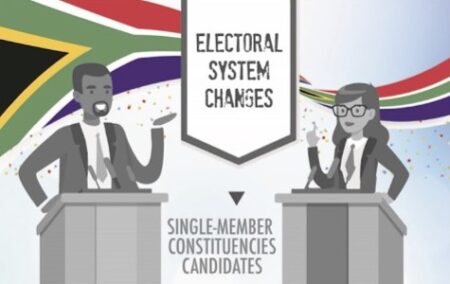A new electoral system is on the cards for South Africa, but what has been proposed is, frankly, a mess.
The new system will be complicated and could lead to distorted outcomes and undermine the principle of proportionality.
While the current system we use to elect our representatives to Parliament and the nine provincial legislatures has its advantages it also has some significant flaws, which amendments to the Electoral Act seek to address.
Current system
In our current system people vote for a party to represent them in the National Assembly and in the various provincial legislatures. This is different from the system which we use at municipal level, where people receive two ballots – one to vote for an individual to represent their particular ward and a second ballot to vote for a party.
The proportion of the vote that a party receives at national and provincial level is then translated into the same proportion of seats in the particular legislature. If a party receives 40% of the vote, they receive 40% of the seats. However, these public representatives are not chosen by the voters but by the parties themselves, which determine which individuals will fill these seats.
While this system results in a high degree of proportionality (unlike the Westminster system used in Britain, for example) voters cannot cast their ballot for an individual, but must vote for a party, which then decides on which individuals will take up the party’s legislative seats. At the same time, individuals cannot run for a position in our provincial and national legislatures; they must be a member of a political party.
This led to a court challenge in 2020, resulting in the Constitutional Court ruling that the Electoral Act had to be amended to allow for individuals – who are not members of political parties – to stand for the provincial and national legislatures.
Amendments
Parliament was given two years to amend the Electoral Act. The new bill with the proposed amendments has been released for public comment, and can be found here. The public has until 21 February to comment.
The new bill, however, is significantly flawed – while it may meet the letter of the court’s ruling, it certainly does not meet its spirit.
The new electoral law – if adopted as is – will split South Africa into nine multi-member constituencies (MMCs) which will follow the borders of each of the provinces. The number of MPs elected from each of the MMCs will be determined by its population. Gauteng will thus most likely have the highest number of MPs, elected from regional seats, with the Northern Cape having the fewest.
Two hundred of the 400 seats in the National Assembly will be filled from these MMCs, while another 200 seats will be filled from a national ‘compensatory’ list.
Complex formula
By a fairly complex formula, a quota will be calculated to determine how many votes are needed for a seat. However, a flaw in the system is that the votes for an independent which are above the quota will simply be discarded. For example, should the quota of votes to secure one seat be 50 000 then a political party which wins 200 000 votes will be entitled to four seats. However, if an independent wins 200 000 votes he or she will be entitled to only one seat, with those additional votes simply being discarded.
In determining the number of compensatory seats a party is entitled to, votes cast for independents in the various MMCs will be disregarded. This will distort proportionality and it is now possible that a party could secure seats that are proportionally relatively higher than its vote share. It will also mean the quota for an independent to secure a seat will effectively be higher than for a political party. This is not only unfair but also contrary to the only constitutional requirement for our electoral system – that it results ‘in general, in proportional representation’.
Something else to consider is that if independents need to compete on what is effectively a provincial level, they will struggle to compete with political parties, which will be better resourced. If constituencies were smaller, independents who emerge from local communities would have a better chance of being elected on a local-issue ticket (which occurs occasionally in constituency systems abroad).
The new bill also explicitly states that if an independent is elected but has to vacate their seat for whatever reason, that seat will simply remain unfilled. However, if an individual vacates a seat which belongs to a political party the party can simply fill it from its electoral list.
The proposed amendments are poor and will not give a fair chance to independents to stand for our legislatures.
The time is now
South Africa must now grasp the nettle and take this opportunity to reform our electoral system to ensure that everyone who wants to stand for the National Assembly or one of the nine provincial legislatures gets a fair shake, whether as an independent or a member of a political party. Any reform must also ensure that our public representatives are truly answerable to their constituents.
And we do not need to reinvent the wheel – much thinking has already been done in South Africa on a new electoral system, and we can also look abroad to see what works well and could be repurposed for use in this country.
Real electoral reform will not be a panacea to our problems. But without it, political accountability in South Africa will continue to remain a pipe dream.
[Graphic: Dorothy Kgosi]

